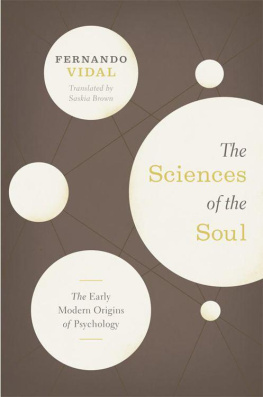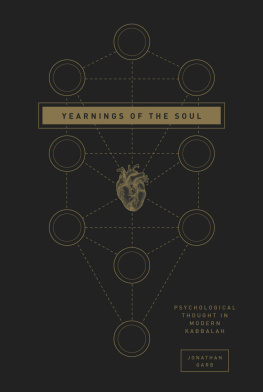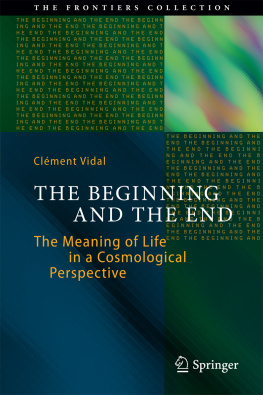Fernando Vidal - The Sciences of the Soul - The Early Modern Origins of Psychology
Here you can read online Fernando Vidal - The Sciences of the Soul - The Early Modern Origins of Psychology full text of the book (entire story) in english for free. Download pdf and epub, get meaning, cover and reviews about this ebook. City: Chicago, year: 2011, publisher: University of Chicago Press, genre: Religion. Description of the work, (preface) as well as reviews are available. Best literature library LitArk.com created for fans of good reading and offers a wide selection of genres:
Romance novel
Science fiction
Adventure
Detective
Science
History
Home and family
Prose
Art
Politics
Computer
Non-fiction
Religion
Business
Children
Humor
Choose a favorite category and find really read worthwhile books. Enjoy immersion in the world of imagination, feel the emotions of the characters or learn something new for yourself, make an fascinating discovery.
- Book:The Sciences of the Soul - The Early Modern Origins of Psychology
- Author:
- Publisher:University of Chicago Press
- Genre:
- Year:2011
- City:Chicago
- Rating:4 / 5
- Favourites:Add to favourites
- Your mark:
- 80
- 1
- 2
- 3
- 4
- 5
The Sciences of the Soul - The Early Modern Origins of Psychology: summary, description and annotation
We offer to read an annotation, description, summary or preface (depends on what the author of the book "The Sciences of the Soul - The Early Modern Origins of Psychology" wrote himself). If you haven't found the necessary information about the book — write in the comments, we will try to find it.
The Sciences of the Soul - The Early Modern Origins of Psychology — read online for free the complete book (whole text) full work
Below is the text of the book, divided by pages. System saving the place of the last page read, allows you to conveniently read the book "The Sciences of the Soul - The Early Modern Origins of Psychology" online for free, without having to search again every time where you left off. Put a bookmark, and you can go to the page where you finished reading at any time.
Font size:
Interval:
Bookmark:
FERNANDO VIDAL is a research scholar at the Max Planck Institute for the History of Science, Berlin.
SASKIA BROWN has translated many books from French, including Homo Juridicus: On the Anthropological Function of the Law , by Alain Supiot.
The University of Chicago Press, Chicago 60637
The University of Chicago Press, Ltd., London
2011 by The University of Chicago
All rights reserved. Published 2011.
Printed in the United States of America
20 19 18 17 16 15 14 13 12 11 1 2 3 4 5
ISBN-13: 978-0-226-85586-8 (cloth)
ISBN-10: 0-226-85586-4 (cloth)
ISBN-13: 978-0-226-85588-2 (e-book)
Originally published as Les sciences de lme XVIe-XVIIIe sicle
2006. ditions Champion, Paris.
Library of Congress Cataloging-in-Publication Data
Vidal, Fernando.
[Sciences de lme. English]
The sciences of the soul : the early modern origins of psychology / Fernando Vidal ; translated by Saskia Brown.
p. cm.
Translation of: Les sciences de lme: XVIe-XVIIIe sicle.
Includes bibliographical references and index.
ISBN-13: 978-0-226-85586-8 (alk. paper)
ISBN-10: 0-226-85586-4 (alk. paper)
I . PsychologyHistory. 2. PsychologyHistory18th century. 3. Soul. I. Brown, Saskia. II. Title.
BF101.V5313 2011
150.9dc22 2011014851
 This paper meets the requirements of ANSI/NISO Z39.48-1992 (Permanence of Paper).
This paper meets the requirements of ANSI/NISO Z39.48-1992 (Permanence of Paper).


The Early Modern Origins of Psychology
FERNANDO VIDAL
Translated by SASKIA BROWN
THE UNIVERSITY OF CHICAGO PRESS
CHICAGO AND LONDON
Figures
Tables
T he Sciences of the Soul may be read as an answer to a question I have often been askedbasically, Did psychology exist in the eighteenth century? The question is understandable insofar as psychology is still widely held to have been founded as a scientific discipline in the last third of the nineteenth century. The reply is that psychology did exist as such in the eighteenth century, and under that name. My interlocutors have frequently reacted with curiosity or suspicion: either this psychology was illegitimately usurping its name, or else it designates a prehistory of the discipline, a sort of history of psychological ideas, perhaps a prescientific, metaphysical approach to the soul. These are some of the misconceptions I wish to address. Between the first attested uses of the term psychology, in the last third of the sixteenth century, and the end of the eighteenth century, psychology existed essentially as a physics of the soul, and it belonged as much to natural philosophy as to Christian anthropology. It remained so throughout this period, despite the break caused by the collapse of Aristotelian frameworks and the transformations of the discipline caused bywhile also contributing tothe demise of the Aristotelian notion of the soul.
Yet the reaction mentioned above is by no means unjustified. At least since the histories of psychology written in the wake of psychologys alleged foundation as a scientific discipline, the very same version of events has been rehearsed time and again. This may explain why, for the period prior to that supposed moment, the vast majority of histories of psychology, historical profiles of the discipline, encyclopedias, dictionaries, and general works on early modern and Enlightenment thought fail to address psychology, whether in name or in substance. The same goes for histories of science, in which psychology prior to the late nineteenth century does not seem to merit inclusion. Such is the state of affairs this book seeks to redress.
I would also like to suggest that what is at stake in the transition from early modern to Enlightenment psychology is not simply historiographical issues but fundamental questions concerning the advent of modern identity and the relations between bodily and psychological identity. We shall address these at the end of our inquiry. But our starting point is elsewhere.
Since words and things are closely linked, and since terminology plays a constitutive role in the development of disciplines and fields of knowledge, we shall explore the history of the term psychology from its invention in the sixteenth century to its redefinition at the beginning of the eighteenth century. This history is of course not purely lexical but allows us to track the transformation of psychologys object, from the soul as the form of all living organisms to the soul as an exclusively human mind (mens). The soul as form could account for the structure and functions of living beings; as mind it became an explanandum , a substance whose operations and contents had to be described through an analysis of its commerce, or interaction, with the body. Although the new psychology borrowed from natural philosophy as reshaped during the Scientific Revolution, its autonomy derived largely from its claim to provide methodological and epistemic principles for all the other sciences of man.
It would be premature to attempt an overview of psychology itself in the eighteenth century. This is partly for conceptual reasons and partly because different regional and national situations would have to be taken into account, and the necessary historiography is still lacking. Since my focus is on the emergence of psychology as a field claiming to be new and autonomous, I will not concentrate on theories and systems but examine the creation of frameworks within which these developed, and mechanisms that legitimated them as psychological. I use the term discipline advisedly, although it is not usually associated with psychology before the last third of the nineteenth century. Psychology, I argue, existed as a discipline before the Enlightenment. The broad cultural field within which it was recast in the eighteenth century was marked by certain core themes, but also by the development of specific forms and contents, and diverse ways of linking theory and practice.
I consequently identify intellectual practices and conceptual configurations that were decisive for defining psychologys borders and subject matter: the invention of a psychological tradition through the writing of its history, the inclusion of psychology within the science of man and the history of humankind, the theorization of psychological methodology, and the elaboration of psychologys place within the organization of knowledge. These intellectual mechanisms went hand in hand with the appropriation by psychology and anthropology of logic, metaphysics, and moralsan appropriation thanks to which Enlightenment psychology came to regard itself as the most useful of all the sciences.
I am grateful to the Athena program of the Swiss National Science Foundation for providing the conditions to explore questions which were new to me at the start of this project. Some of the preliminary research was carried out when I was a visiting scholar in the Department of the History of Science at Harvard University, which I thank for its hospitality. The Max Planck Institute for the History of Science, Berlin, has been an ideal place to pursue this research. I thank in particular the institutes librarians for their kind and efficient assistance, and Zoe Schlepfer for help on this English-language edition. Some of the ideas discussed here were addressed in lectures, seminars, and classes given at the cole des Hautes tudes en Sciences Sociales, the Universidade do Estado do Rio de Janeiro, and the Pontificia Universidade Catlica do Rio de Janeiro. I would like to thank my hosts at these institutions, namely, Jacqueline Carroy and Franois Azouvi, Ana Jac, and Maria Apparecida Mamede. Many friends and colleagues accompanied this work in very different ways. I can mention but a few of them here: Bronislaw Bac-zko, Vincent Barras, Antonio Battro, Jacques Berchtold, Claude Blanckaert, Marie-Nolle Bourguet, Caroline Bynum, Mary Campbell, Andrea Carlino, Lorraine Daston, Claire Gantet, Mechthild Fend, Toms Fernndez, Abigail Lustig, Francisco Ortega, Katharine Park, Franoise Parot, Cristina Pitassi, Michel Porret, the late Roy Porter, Sonu Shamdasani, Patrick Singy, Jean Starobinski, Friedrich Steinle, Claudia Swan, and Anke te Heesen.
Next pageFont size:
Interval:
Bookmark:
Similar books «The Sciences of the Soul - The Early Modern Origins of Psychology»
Look at similar books to The Sciences of the Soul - The Early Modern Origins of Psychology. We have selected literature similar in name and meaning in the hope of providing readers with more options to find new, interesting, not yet read works.
Discussion, reviews of the book The Sciences of the Soul - The Early Modern Origins of Psychology and just readers' own opinions. Leave your comments, write what you think about the work, its meaning or the main characters. Specify what exactly you liked and what you didn't like, and why you think so.









